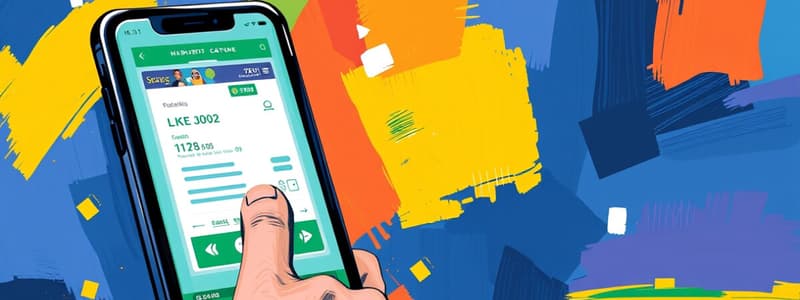Podcast
Questions and Answers
What primary challenge do banks face in verifying check authenticity through RDC transactions?
What primary challenge do banks face in verifying check authenticity through RDC transactions?
- Lack of physical interaction prevents real-time examination of documents. (correct)
- Bank policies do not allow for electronic check verification.
- Limited software capabilities restrict verification processes.
- Increased regulations hinder the ability to verify checks.
Which of the following is NOT a recommended practice for mitigating risks associated with RDC services?
Which of the following is NOT a recommended practice for mitigating risks associated with RDC services?
- Monitoring for unusually high-value deposits.
- Allowing unrestricted use of new technologies without risk evaluation. (correct)
- Integrating RDC into broader Anti-Money Laundering (AML) controls.
- Conducting risk assessments before introducing new products.
Which scenario indicates a potential fraud risk that banks should monitor in RDC transactions?
Which scenario indicates a potential fraud risk that banks should monitor in RDC transactions?
- Frequent deposits made by the same customer.
- Simultaneous deposits of checks with sequential numbers. (correct)
- Deposits made through secure bank branches.
- Single deposits of personal checks within the daily limit.
What key factor should banks consider when evaluating the suitability of new products for customers?
What key factor should banks consider when evaluating the suitability of new products for customers?
Which of the following is an indicator of potentially suspicious money order deposits?
Which of the following is an indicator of potentially suspicious money order deposits?
What is a limitation of RDC transactions compared to traditional check transactions?
What is a limitation of RDC transactions compared to traditional check transactions?
In the context of RDC, which of the following is an essential element of risk-mitigation strategies?
In the context of RDC, which of the following is an essential element of risk-mitigation strategies?
What is one major advantage of Remote Deposit Capture (RDC) for banks?
What is one major advantage of Remote Deposit Capture (RDC) for banks?
Why do money launderers prefer Remote Deposit Capture (RDC) services?
Why do money launderers prefer Remote Deposit Capture (RDC) services?
Which of the following poses a challenge for banks utilizing RDC regarding customer identification?
Which of the following poses a challenge for banks utilizing RDC regarding customer identification?
What risk associated with Remote Deposit Capture can make fraud detection more difficult?
What risk associated with Remote Deposit Capture can make fraud detection more difficult?
Which regulatory body has stringent policies against accepting funds from blocked nations that can be circumvented through RDC?
Which regulatory body has stringent policies against accepting funds from blocked nations that can be circumvented through RDC?
What is a primary function of Remote Deposit Capture in the banking process?
What is a primary function of Remote Deposit Capture in the banking process?
What is a significant operational disadvantage of Remote Deposit Capture for banks?
What is a significant operational disadvantage of Remote Deposit Capture for banks?
What technological advancement does Remote Deposit Capture (RDC) primarily rely on?
What technological advancement does Remote Deposit Capture (RDC) primarily rely on?
Flashcards are hidden until you start studying
Study Notes
Understanding Remote Deposit Capture (RDC)
- Remote Deposit Capture (RDC) allows customers to deposit checks electronically via mobile applications by photographing checks instead of visiting bank branches.
- Banks receive and process the uploaded images quickly, leading to reduced in-person transactions and streamlined banking experiences.
- Benefits for banks include lower operational costs, while customers enjoy convenience and reduced travel times.
- Large correspondent banks often provide RDC services to smaller foreign respondent banks, enhancing efficiency in deposit and clearing processes.
Money-Laundering Risks Associated with RDC Services
- RDC poses risks of money laundering due to its anonymity; users can deposit checks without physical bank visits, hindering employee detection of suspicious activities.
- Multiple users can access a single RDC application, allowing numerous anonymous individuals to deposit checks into one account, complicating monitoring.
- Compliance challenges arise in Know Your Customer (KYC) processes, making it difficult for banks to identify the location of check deposits.
- Regulatory bodies like OFAC enforce strict policies against funds from blocked nations, and RDC could inadvertently bypass these restrictions.
Fraud Risks Associated with RDC Services
- The reliance on digital transactions increases the risk of fraud, as limited human review makes it difficult to detect altered checks or duplicate deposits.
- Traditional verification methods, such as examining checks for signs of tampering or quality issues, are less effective without physical interaction.
- The absence of face-to-face teller interactions reduces opportunities for staff to ask questions that might protect customers from scams, including those from mystery shopping schemes.
Mitigating Risks Associated with RDC Services
- Effective risk management should integrate RDC into broader Anti-Money Laundering (AML) controls and fraud-prevention measures.
- Banks should monitor for unusual deposit patterns, including:
- High-value or high-volume deposits
- Rapid successive deposits of checks with sequential numbers
- Money orders that lack the payee's name
- Conducting risk assessments is essential before introducing new products to identify vulnerabilities and develop risk-mitigation strategies.
- Best practices include evaluating new products on a customer-by-customer basis and limiting transaction capabilities with RDC to enhance security.
Studying That Suits You
Use AI to generate personalized quizzes and flashcards to suit your learning preferences.




